Dysrhythmia1 - Study guides, Class notes & Summaries
Looking for the best study guides, study notes and summaries about Dysrhythmia1? On this page you'll find 27 study documents about Dysrhythmia1.
Page 2 out of 27 results
Sort by
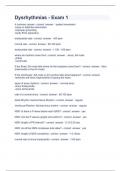
-
Dysrhythmia1 Question and answers already passed 2023/2024
- Exam (elaborations) • 5 pages • 2023
- Available in package deal
-
- $13.49
- + learn more
Dysrhythmia1 Question and answers already passed 2023/20244 common causes - correct answer -patient movement -loose or defective electrodes -improper grounding -faulty ECG apparatus bradycardia rate - correct answer <60 bpm normal rate - correct answer 60-100 bpm tachycardia rate - correct answer > 100 - 160 bpm where do rhythms come from - correct answer -sinus; SA node -Artrial -Ventricular If the Atrial; SA node fails where do the impulses come from...
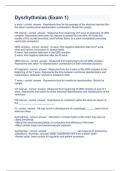
-
Dysrhythmia1 Question and answers already passed 2023/2024
- Exam (elaborations) • 5 pages • 2023
- Available in package deal
-
- $12.99
- + learn more
Dysrhythmia1 Question and answers already passed 2023/2024p wave - correct answer Represents time for the passage of the electrical impulse thru the atrium causing atrial depolarization (contraction). Should be upright: PR interval - correct answer Measured from beginning of P wave to beginning of QRS complex. Represents time taken for impulse to spread thru the atria, AV node and bundle of His, bundle branches, and Purkinje fibers, to a point immediately preceding ventricular contract...
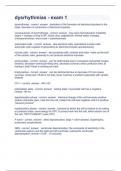
-
dysrhythmia1 Question and answers already passed 2023/2024 verified to pass
- Exam (elaborations) • 6 pages • 2023
- Available in package deal
-
- $13.99
- + learn more
dysrhythmia1 Question and answers already passed 2023/2024 verified to passdysrhythmias - correct answer disorders of the formation of electrical impulses in the heart, disorders of conduction of electrical impulses consequences of dysrhythmias - correct answer may have hemodynamic instability (signs = change or drop in BP, blood clots, palpitations, mental status changes, unresponsiveness, worst case = pulselessness) pacemaker cells - correct answer aka electrical cells, speciali...
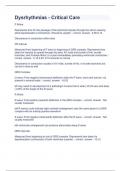
-
Dysrhythmia1 d questions and answers rated A+ 2024
- Exam (elaborations) • 8 pages • 2024
- Available in package deal
-
- $13.59
- + learn more
Dysrhythmia1 d questions and answers rated A+ 2024
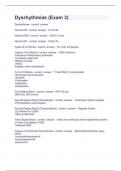
-
Dysrhythmia1 Question and answers correctly solved 2023/2024
- Exam (elaborations) • 10 pages • 2023
- Available in package deal
-
- $12.99
- + learn more
DysrhythmDysrhythmias - correct answer Normal PRI - correct answer 0.12-0.20 Normal QRS - correct answer 0.06-0.10 sec Normal QTI - correct answer 0.32-0.42 Types of AV Blocks - correct answer 1st, 2nd, 3rd degree Causes of AV Blocks - correct answer -CAD/ infarction -Infectious/ inflammatory processes -Increased vagal tone -Effects of drugs -Aging Surgery/ valve replacement Tx for AV Blocks - correct answer * Treat ONLY if symptomatic "All People...
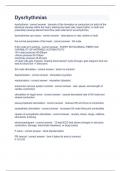
-
Dysrhythmia1 Question and answers correctly solved 2023/2024
- Exam (elaborations) • 7 pages • 2023
- Available in package deal
-
- $13.99
- + learn more
Dysrhythmia1 Question dysrhythmia - correct answer disorder of the formation or conduction (or both) of the electrical impulse within the heart, altering the heart rate, heart rhythm, or both and potentially causing altered blood flow (also referred to as arrhythmia) dysrhythmias can cause - correct answer disturbance in rate, rhythm or both the normal pacemaker of the heart - correct answer SA node if SA node isn't working - correct answer EVERY MYOCARDIAL FIBER HAS CAPABILITY...
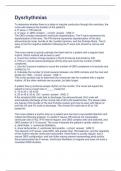
-
Dysrhythmia1 Question and answers 2023/2024 verified to pass
- Exam (elaborations) • 9 pages • 2023
- Available in package deal
-
- $13.49
- + learn more
DysrhythmTo determine whether there is a delay in impulse conduction through the ventricles, the nurse will measure the duration of the patient's a. P wave. c. PR interval. b. Q wave. d. QRS complex. - correct answer ANS: D The QRS complex represents ventricular depolarization. The P wave represents the depolarization of the atria. The PR interval represents depolarization of the atria, atrioventricular node, bundle of His, bundle branches, and the Purkinje fibers. The Q wave is the first...
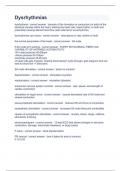
-
Dysrhythmia1 b questions and answers rated A+ 2024
- Exam (elaborations) • 7 pages • 2024
- Available in package deal
-
- $12.99
- + learn more
Dysrhythmia1 b questions and answers rated A+ 2024
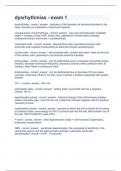
-
dysrhythmia1 Question and answers rated A+ 2023/2024
- Exam (elaborations) • 6 pages • 2023
- Available in package deal
-
- $14.49
- + learn more
dysrhythmia1 Questiodysrhythmias - correct answer disorders of the formation of electrical impulses in the heart, disorders of conduction of electrical impulses consequences of dysrhythmias - correct answer may have hemodynamic instability (signs = change or drop in BP, blood clots, palpitations, mental status changes, unresponsiveness, worst case = pulselessness) pacemaker cells - correct answer aka electrical cells, specialized muscle cells; automatic cells capable of generatin...
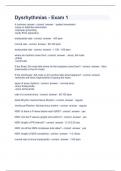
-
Dysrhythmia1 Question and answers rated A+ 2023/2024
- Exam (elaborations) • 5 pages • 2023
- Available in package deal
-
- $13.49
- + learn more
Dysrhythmia1 Que 4 common causes - correct answer -patient movement -loose or defective electrodes -improper grounding -faulty ECG apparatus bradycardia rate - correct answer <60 bpm normal rate - correct answer 60-100 bpm tachycardia rate - correct answer > 100 - 160 bpm where do rhythms come from - correct answer -sinus; SA node stion and answers rated A+ 2023/2024

Did you know that on average a seller on Stuvia earns $82 per month selling study resources? Hmm, hint, hint. Discover all about earning on Stuvia


